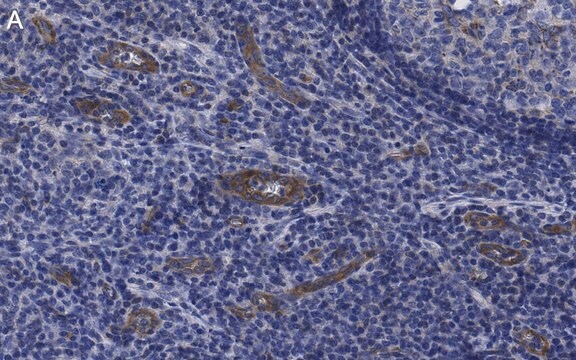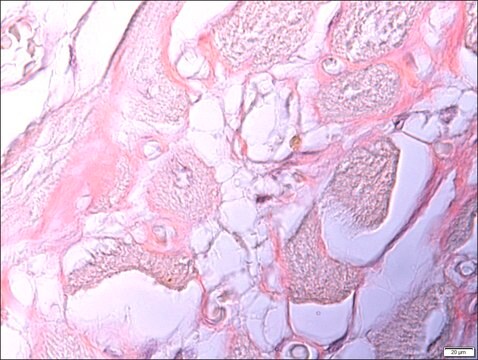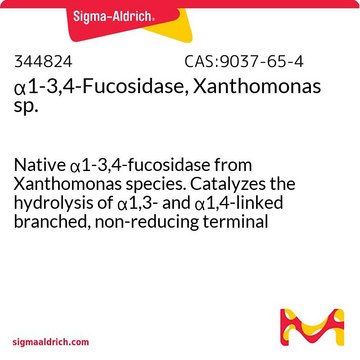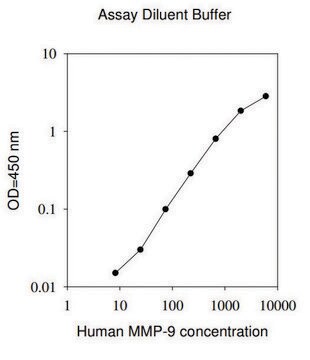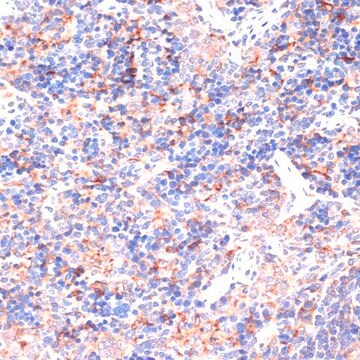おすすめの製品
由来生物
rat
品質水準
抗体製品の状態
purified antibody
抗体製品タイプ
primary antibodies
クローン
1D4, monoclonal
交差性
human
交差性(ホモロジーによる予測)
mouse (based on 100% sequence homology)
テクニック
flow cytometry: suitable
immunocytochemistry: suitable
immunohistochemistry: suitable
western blot: suitable
アイソタイプ
IgG2aκ
NCBIアクセッション番号
UniProtアクセッション番号
輸送温度
wet ice
ターゲットの翻訳後修飾
unmodified
遺伝子情報
human ... PLET1(349633)
詳細
Placenta-expressed transcript-1 (Plet-1) is a recently identified protein that as of yet has no known function and is not associated with any one family of proteins. Its observation has been restricted to developing mesonephros and pharyngeal endoderm. Observation in adult tissue is more widely expressed, having been found in several locations such as mammary, pancreas and prostate epithelia. Its location in the pancreas is notable as the pancreas is a well known reserve for stem cells and progenitor cells. Within the pancreas, Plet-1 has been shown to be localized in the major duct epithelium, and as such will serve as an excellent marker for epithelial progenitor cells and stem cells, and as a useful implement for observing the genetics of linear relationships and the operation of molecular mechanisms for homeostasis, development and wound healing in organ and tissue systems.
Recently, Plet-1 has been identified as a specific marker of early thymic epithelial progenitor cells. In the postgastrulation embryo, Plet-1 expression is highly restricted to the developing pharyngeal endoderm and mesonephros. This antibody recognizes the same protein as MTS20 and MTS24.
Recently, Plet-1 has been identified as a specific marker of early thymic epithelial progenitor cells. In the postgastrulation embryo, Plet-1 expression is highly restricted to the developing pharyngeal endoderm and mesonephros. This antibody recognizes the same protein as MTS20 and MTS24.
特異性
This antibody recognizes Plet-1.
免疫原
Epitope: Unknown
Full length recombinant protein corresponding to Plet-1.
アプリケーション
Research Category
幹細胞研究
幹細胞研究
Research Sub Category
多能性及び初期分化
多能性及び初期分化
Flow Cytometry Analysis: A previous lot was used by an independent laboratory in FC (Depreter, M.G.L., et al., 2008).
Immunohistochemistry Analysis: A previous lot was used by an independent laboratory in IH (Depreter, M.G.L., et al., 2008).
Immunocytochemistry Analysis: A previous lot was used by an independent laboratory in IC (Depreter, M.G.L., et al., 2008).
Immunohistochemistry Analysis: A previous lot was used by an independent laboratory in IH (Depreter, M.G.L., et al., 2008).
Immunocytochemistry Analysis: A previous lot was used by an independent laboratory in IC (Depreter, M.G.L., et al., 2008).
This Anti-Plet-1 (Placenta-expressed transcript 1 protein) Antibody, clone 1D4 is validated for use in WB, IC, IH, FC for the detection of Plet-1 (Placenta-expressed transcript 1 protein).
品質
Evaluated by Western Blot in human placenta cell lysate.
Western Blot Analysis: A 1:2,500 dilution of this antibody detected Plet-1 in 10 µg of human placenta cell lysate.
Western Blot Analysis: A 1:2,500 dilution of this antibody detected Plet-1 in 10 µg of human placenta cell lysate.
ターゲットの説明
~ 23 kDa
物理的形状
Protein G Purified
Format: Purified
Purified rat monoclonal IgG2aκ in buffer containing 0.1 M Tris-Glycine (pH 7.4, 150 mM NaCl) with 0.05% sodium azide.
保管および安定性
Stable for 1 year at 2-8°C from date of receipt.
アナリシスノート
Control
Human placenta cell lysate
Human placenta cell lysate
免責事項
Unless otherwise stated in our catalog or other company documentation accompanying the product(s), our products are intended for research use only and are not to be used for any other purpose, which includes but is not limited to, unauthorized commercial uses, in vitro diagnostic uses, ex vivo or in vivo therapeutic uses or any type of consumption or application to humans or animals.
適切な製品が見つかりませんか。
製品選択ツール.をお試しください
保管分類コード
12 - Non Combustible Liquids
WGK
WGK 1
引火点(°F)
Not applicable
引火点(℃)
Not applicable
適用法令
試験研究用途を考慮した関連法令を主に挙げております。化学物質以外については、一部の情報のみ提供しています。 製品を安全かつ合法的に使用することは、使用者の義務です。最新情報により修正される場合があります。WEBの反映には時間を要することがあるため、適宜SDSをご参照ください。
Jan Code
MAB4416:
試験成績書(COA)
製品のロット番号・バッチ番号を入力して、試験成績書(COA) を検索できます。ロット番号・バッチ番号は、製品ラベルに「Lot」または「Batch」に続いて記載されています。
Bénédicte Oulès et al.
Nature communications, 11(1), 5067-5067 (2020-10-22)
Although acne is the most common human inflammatory skin disease, its pathogenic mechanisms remain incompletely understood. Here we show that GATA6, which is expressed in the upper pilosebaceous unit of normal human skin, is down-regulated in acne. GATA6 controls keratinocyte
ライフサイエンス、有機合成、材料科学、クロマトグラフィー、分析など、あらゆる分野の研究に経験のあるメンバーがおります。.
製品に関するお問い合わせはこちら(テクニカルサービス)
